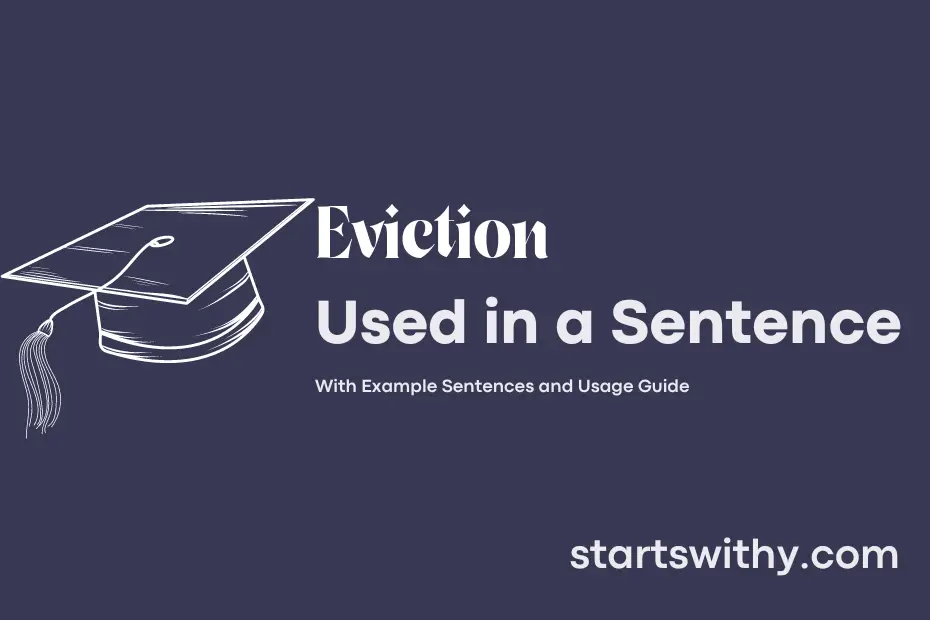Have you ever wondered what the term “eviction” actually means? In simple terms, eviction is the legal process of removing a tenant from a property by a landlord due to various reasons such as non-payment of rent or violating the terms of the lease agreement.
Evictions can be a stressful and emotionally challenging experience for both landlords and tenants. Understanding the legal rights and responsibilities of each party is crucial in navigating the eviction process effectively.
7 Examples Of Eviction Used In a Sentence For Kids
- Eviction means someone has to leave their home.
- The family received an eviction notice.
- They had to find a new place to live after the eviction.
- The sheriff came to enforce the eviction order.
- They felt sad about the eviction.
- The neighbors helped them pack after the eviction.
- It is important to be kind to people facing eviction.
14 Sentences with Eviction Examples
- Eviction notices were served to the students who were found violating the rules of the hostel.
- The group of friends faced eviction from their shared apartment due to unpaid rent.
- Some students had to deal with the stress of impending eviction from their accommodations as they struggled to pay their dues.
- The student union protested against the sudden eviction of several students from the campus dormitories.
- A senior student provided legal advice to the freshman who was threatened with eviction from his flat.
- The college administration informed the students about the possibility of eviction if they did not adhere to the guidelines of social distancing in the hostels.
- Due to a misunderstanding, the international student faced eviction from the student housing facility.
- A group of students organized a fundraiser to help their friend avoid eviction from his rented room.
- The strict landlord issued an eviction notice to the students for having a late-night party in the apartment.
- The college authorities gave a final warning to the student before proceeding with the eviction process.
- The student faced eviction after his roommates complained about his constant noise and disruptive behavior.
- A student sought help from the college counselor to prevent eviction from his room due to mental health issues affecting his behavior.
- The college student had to request an extension for paying the rent to avoid eviction from the campus housing.
- Despite their best efforts to negotiate with the landlord, the students were ultimately forced to accept the eviction notice.
How To Use Eviction in Sentences?
To use Eviction correctly in a sentence, first, understand that Eviction refers to the legal process of removing a tenant from a property.
When constructing a sentence with Eviction, always make sure to include the following components: the subject (the person or entity taking action), the action itself (the Eviction), and the object (the tenant being removed).
For example, a sentence using Eviction could be: “The landlord filed for eviction after the tenant failed to pay rent for three consecutive months.”
In this sentence, “The landlord” is the subject, “filed for eviction” is the action, and “the tenant” is the object. By including these elements, you can effectively convey the meaning of Eviction in your sentence.
It is important to note that Eviction is a serious legal matter and should not be taken lightly. When using this term in a sentence, make sure to consider the context and implications of the action being described.
By following these guidelines and understanding the meaning of Eviction, you can confidently incorporate this term into your writing to accurately convey the process of removing a tenant from a property.
Conclusion
Eviction is a legal process where a tenant is removed from a property by the landlord. It can happen when a tenant fails to pay rent, violates the lease agreement, or causes damage to the property. For example, “The landlord issued an eviction notice after the tenant fell behind on rent for several months.” Eviction can have serious consequences for both landlords and tenants, leading to financial loss and instability in housing. “The family faced homelessness following their eviction from the apartment due to noise complaints.”
It is important for both landlords and tenants to understand their rights and responsibilities to avoid facing eviction. Seeking legal assistance or negotiating a resolution can often prevent the need for eviction and protect both parties from the negative ramifications of this legal process.



